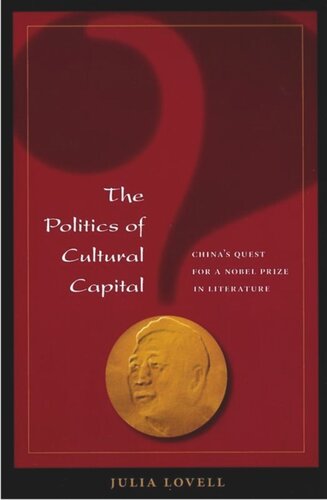

Most ebook files are in PDF format, so you can easily read them using various software such as Foxit Reader or directly on the Google Chrome browser.
Some ebook files are released by publishers in other formats such as .awz, .mobi, .epub, .fb2, etc. You may need to install specific software to read these formats on mobile/PC, such as Calibre.
Please read the tutorial at this link: https://ebookbell.com/faq
We offer FREE conversion to the popular formats you request; however, this may take some time. Therefore, right after payment, please email us, and we will try to provide the service as quickly as possible.
For some exceptional file formats or broken links (if any), please refrain from opening any disputes. Instead, email us first, and we will try to assist within a maximum of 6 hours.
EbookBell Team

0.0
0 reviewsIn the 1980s China’s politicians, writers, and academics began to raise an increasingly urgent question: why had a Chinese writer never won a Nobel Prize for literature? Promoted to the level of official policy issue and national complex, Nobel anxiety generated articles, conferences, and official delegations to Sweden. Exiled writer Gao Xingjian’s win in 2000 failed to satisfactorily end the matter, and the controversy surrounding the Nobel committee’s choice has continued to simmer.
Julia Lovell’s comprehensive study of China’s obsession spans the twentieth century and taps directly into the key themes of modern Chinese culture: national identity, international status, and the relationship between intellectuals and politics. The intellectual preoccupation with the Nobel literature prize expresses tensions inherent in China’s move toward a global culture after the collapse of the Confucian world-view at the start of the twentieth century, and particularly since China’s re-entry into the world economy in the post-Mao era. Attitudes toward the prize reveal the same contradictory mix of admiration, resentment, and anxiety that intellectuals and writers have long felt toward Western values as they struggled to shape a modern Chinese identity. In short, the Nobel complex reveals the pressure points in an intellectual community not entirely sure of itself.
Making use of extensive original research, including interviews with leading contemporary Chinese authors and critics, The Politics of Cultural Capital is a comprehensive, up-to-date treatment of an issue that cuts to the heart of modern and contemporary Chinese thought and culture. It will be essential reading for scholars of modern Chinese literature and culture, globalization, post-colonialism, and comparative and world literature.